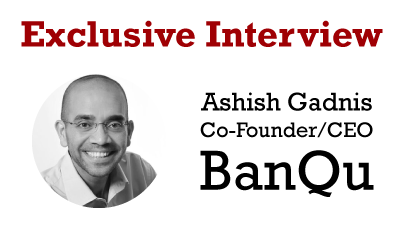
Epañol
Durante el evento La Semana del Gobierno Digital 2017, celebrado en el centro de conferencias Corferias en la ciudad de Bogotá, el CEO de BanQu, Ashish Gadnis, dictó una conferencia sobre los beneficios de la implementación de la tecnología Blockchain, sobre todo en sociedades en las que hay un alto índice de personas en situación de pobreza extrema.
Gadnis inició su conferencia ilustrando con algunos ejemplos personales que pusieron en evidencia ciertos problemas que aún tienen lugar. Compartió una anécdota sobre su infancia: dijo que su familia era beneficiaria del sistema de distribución de alimentos dirigido para personas en pobreza extrema en la ciudad de Bombay – al cual se podía acceder mediante el uso de una tarjeta – pero que, más allá de ello, los beneficiados no tenían derecho a otros servicios porque jurídicamente no existían.
Utilizó otra historia como ejemplo: En una oportunidad acompañó a una persona proveniente de una comunidad de bajos recursos a una institución bancaria para abrir una cuenta y acceder a un crédito para establecer un negocio propio. A pesar de que la persona contaba con cierta cantidad de ahorros para ello, los representantes de la entidad rechazaron la solicitud por el simple hecho de que el solicitante no podía proveer la documentación básica asociada con su identidad y con su reputación comercial.
Estas anécdotas pusieron en evidencia un problema muy presente en la actualidad vinculado con la identidad económica: Si una persona no puede probar ante cualquier institución financiera cierto potencial para la realización de actividades comerciales, la entidad no va a darle la oportunidad de un crédito para que invierta. Lo mismo pasa con personas refugiadas o desplazadas por conflictos bélicos, ya que muchos no tienen la capacidad de demostrar su existencia en registros de salud o instituciones educativas más allá de los que provea una ONG que haga supervisión del caso.
No somos dueños de nuestros datos
En opinión de Gadnis, el gran problema está en que las grandes instituciones y ministerios manejan de forma centralizada los datos asociados con las personas y, al no tener el alcance o el interés suficiente para llegar a sectores donde hay niveles muy altos de pobreza, las personas quedan desasistidas y sin posibilidad de ser partícipes de todos los derechos que les corresponden.
El problema fundamental es que las personas no existen porque no son dueñas de sus datos”.
Es aquí donde la tecnología Blockchain puede ayudar, ya que más allá del uso de las monedas digitales, el libro mayor descentralizado tiene la particularidad de que puede generar muchas copias de la información asociada con cada persona, lo cual permitiría a los individuos probar su participación en actividades comerciales ratificando la existencia de su identidad económica.
Ingles
During the 2017 Digital Government Week event, held at the Corferias conference center in the city of Bogotá, BanQu CEO Ashish Gadnis gave a lecture on the benefits of the implementation of the Blockchain technology, especially in companies in those that there is a high index of people in situation of extreme poverty.
Gadnis began his lecture by illustrating with some personal examples that brought to light certain problems that still take place. He shared an anecdote about his childhood: he said that his family was a beneficiary of the food distribution system aimed at people in extreme poverty in the city of Bombay - which could be accessed through the use of a card - but beyond that , the beneficiaries did not have the right to other services because legally they did not exist.
He used another story as an example: On one occasion he accompanied a person from a low-income community to a banking institution to open an account and access a loan to establish a business of his own. Although the person had a certain amount of savings for this, the representatives of the entity rejected the request for the simple fact that the applicant could not provide the basic documentation associated with their identity and with their commercial reputation.
These anecdotes revealed a very present problem that is currently linked to economic identity: If a person can not prove any potential for carrying out commercial activities before any financial institution, the entity is not going to give him the opportunity of a loan so that invest The same happens with refugees or displaced by armed conflicts, since many do not have the capacity to demonstrate their existence in health registers or educational institutions beyond those provided by an NGO that supervises the case.
We do not own our data
In the opinion of Gadnis, the big problem is that the large institutions and ministries handle in a centralized way the data associated with people and, since they do not have the scope or the sufficient interest to reach sectors where there are very high levels of poverty, the people are left unassisted and unable to participate in all the rights that correspond to them.
The fundamental problem is that people do not exist because they do not own their data ".
This is where the Blockchain technology can help, since beyond the use of digital currencies, the decentralized ledger has the peculiarity that it can generate many copies of the information associated with each person, which would allow individuals to prove their participation in commercial activities ratifying the existence of their economic identity.
Fuentes